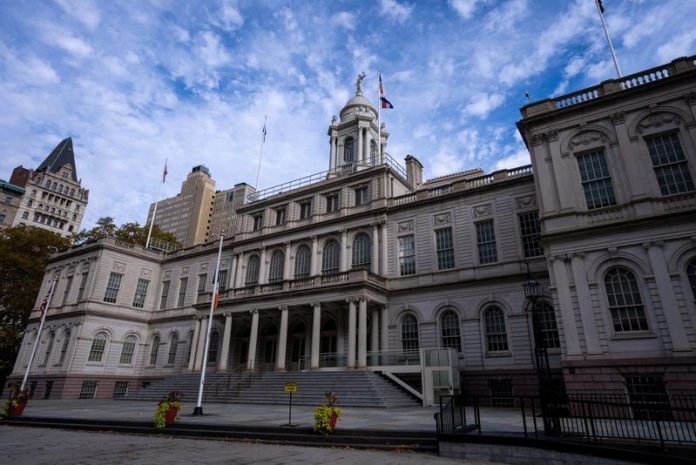By Maria Tsvetkova
NEW YORK (Reuters) -When Zohran Mamdani finished his victory speech late Tuesday after winning the New York City mayoral race, a small crowd gathered around a man with blonde, curly hair who had watched the candidate with a satisfied smile from a corner of the stage.
Morris Katz, lead media strategist for Mamdani’s campaign, had every reason to celebrate. He was part of the team that helped shape the candidate’s stunningly successful message around three promises that resonated with voters, many of them young: a rent freeze, free buses, and universal childcare.
Katz began working with Mamdani last year, long before the June primary election in which the then little-known member of the state assembly captured the Democratic Party nomination for mayor. The strategist said it was important that Mamdani crafted a bold message that reflected “what we believe in.”
“There are a lot of votes to be won, and we don’t have to live confined to politics as it is. But if we dare to imagine politics as it can be, we can build that very politics,” he said after Mamdani handily defeated former New York Governor Andrew Cuomo, who ran as an independent, and Republican Curtis Sliwa.
Katz was right: there were a lot of votes to be won on Tuesday. Mamdani’s progressive message energized New Yorkers, including many who sat out last year’s presidential election, propelling turnout to more than 2 million. That was the highest for a mayoral election since 1969, according to the New York City Board of Elections.
The surge was driven by a wave of young voters, newcomers to the city, first-time voters and renters, according to NBC News exit polls. Many of them were galvanized by the 34-year-old Mamdani’s proposals to lower the cost of living in the most populous U.S. city and perhaps its most expensive.
“Just the idea that someone young and new can try new ideas and bring new policies into the city was inspiring to me,” said Michael Darby, a 26-year-old bartender and actor, after voting in Brooklyn.
HISTORIC WIN DRAWS DIVERSE COALITION
Despite the youthful cast of his coalition, the Ugandan-born Mamdani – the city’s first Muslim mayor-elect and the first of South Asian descent – appealed to a broad spectrum of voters in a city known for its diversity.
He won four out of five of the city’s boroughs, cementing the lead that he had established with his surprise victory in the June primary, when he knocked off Cuomo, scion of one of the state’s most prominent political families and a heavy favorite.
Humayun Ahmed, a 62-year-old owner of a small business who moved to New York from Bangladesh decades ago, is a registered Democrat but voted for Trump in 2024, hoping for a change. This time, he cast his ballot for Mamdani, impressed by the promise to address an affordability crisis.
“You need to balance between rich and poor,” Ahmed said.
While the progressive Mamdani was clearly a banner story for Election Day 2025, he shared the limelight with two moderate Democrats – Mikie Sherrill and Abigail Spanberger, elected as governors of New Jersey and Virginia, respectively.
Still, his decisive win offers at least one blueprint for foundering Democrats to find their footing in the November 2026 midterm elections, when the party hopes to pick up enough congressional seats to put the brakes on President Donald Trump’s agenda.
But failure to make good on his promises could set back the party next year and beyond.
FEAR OF EXODUS OF THE WEALTHY, CORPORATIONS
Mamdani’s proposals for higher taxes have stirred fears of an exodus by the wealthy and corporations from New York, the U.S. financial hub. That could well stop Mamdani’s agenda in its tracks and disillusion the voters who put their faith in him.
Many of Mamdani’s key promises will require tax increases that New York’s centrist Governor Kathy Hochul and the leaders of the state legislature may be reluctant to back.
Like Mamdani, the governor is sympathetic to the need for boosting child services and affordable housing programs, but her proposals have been less ambitious than those put forward by Mamdani, said Grant Reeher, a Syracuse University political science professor.
“I think his vision is much more expansive than hers on both of those fronts and much faster,” he said. “One of the things that Hochul is very keen on is not to be seen as imposing a new tax, even if it’s on the wealthiest people.”
In electing Mamdani, the city also risks an aggressive pushback from Trump, who has already threatened to cut federal funding for the city. Republicans have quickly branded Mamdani – a self-described democratic socialist – as looney-left “communist” and tried to link other Democrats to him.
Even under the most optimistic scenario, it will take time to deliver on Mamdani’s affordability agenda, said Basil Smikle, a professor at Columbia University and former executive director of the state Democratic Party.
“New York is notoriously difficult to govern,” he said. Mamdani will “have to spend most of the time in the first year actually uniting the city around specific ideas before they move forward.”
(Reporting by Maria Tsvetkova in New York; Editing by Frank McGurty and Deepa Babington)
Disclaimer: This report is auto generated from the Reuters news service. ThePrint holds no responsibility for its content.






